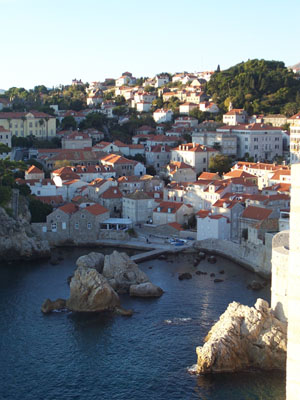TABLE
OF CONTENTS
|
A
Separate Part
By Jane Wiseman

Croatia
is a
beautiful country and during my visit there I was pleasantly surprised
to find
a minimal amount of transnational influence. Although the entire
country could
easily be characterized as rather isolated from surrounding influence,
I would
say that Dubrovnik
especially has the vernacular side to it that I have rarely encountered
in a
city. From the small “OldTown” section of town to the main port area,
I saw,
almost exclusively, the vernacular Croatia rather than a
transnational
space.
Perhaps
this is because Croatia
is still recovering from the war in 1991 and the people are more
interested in
sustaining their livelihood rather than investing in extraneous items
(such as
designer clothes). It was a nice change of pace to be in a place that
thrives
on tourism, and yet doesn’t require the huge billboards and ads that I
found in
many of the other big cities we visited during our voyage. Although, as
a
visitor to Croatia,
the lack
of advertisements was simply a positive aspect of my visit, I tried to
look
beyond the obvious as think about why Croatia has such a lack of
transnational influence. Perhaps the war itself, resulting in deaths
and
emotional destruction of the Croatian population, has deterred the
country from
readily accepting transnational influence of other countries. Other
countries
that had a hand in the war against Croatia. In Irena Plekic’s
article
“Fear, Death, and Resistance” she talks about what influences people
who have
been affected by war. This relates to how the people of Croatia
are
simply trying to maintain their standard of living and are not
preoccupied with
transnational frivolity.
Although
I was able to visit Croatia
because of a transnational voyage of discovery and Croatia
does have a huge tourism
market, the country has somehow managed to stay relatively unaffected
by
transnational influences. The Croatians have been able to keep their
vernacular
identity separate from transnational influences, even those that they
count on
the keep their economy going. Croatia
is definitely on the transnational map, however it has managed to keep
itself
fairly separate from the transnational aspects that one encounters in
most
cities.
|

